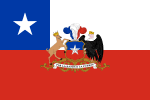President of Chile
| President of the Republic of Chile | |
|---|---|
|
| |
| Style | His/Her Excellency |
| Residence | No official residence |
| Seat | La Moneda Palace |
| Term length | Four years, not eligible for re-election immediately |
| Inaugural holder | Manuel Blanco Encalada |
| Formation | 9 July 1826 |
| Succession |
Minister of the Interior (as Vice-President) |
| Website |
www |
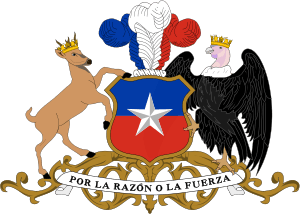 |
| This article is part of a series on the politics and government of Chile |
| Comptroller General |
| Constitutional Court |
| Foreign relations |
The President of the Republic of Chile (Spanish: Presidente de la República de Chile) is the head of state and the head of government of the Republic of Chile. The President is responsible for both government and state administration.[1] Although its role and significance has changed over the history of Chile, as well as its position and relations with other actors in the national political organization, it is one of the most prominent political figures. It is also considered as one of the institutions that make up the "Historic Constitution of Chile", and is essential to the country's political stability.[2]
Under the current Constitution (adopted in 1980), the President is elected to serve for a period of four years, with immediate re-election being prohibited. The shorter period (previously the term was six years) allows for parliamentary and presidential elections to be synchronized. The official seat of the President of Chile is the La Moneda Palace in the capital Santiago.
Features of the office
Requirements
The Constitution of 1980 and its consecutive amendments (2005), establishes the requirements for becoming President. Originally the President must be a natural-born citizen of the country. The President must also be at least 35 years old. In addition, all the requirements for becoming a Senator apply. The president must meet all the requirements to qualify as a fully Chilean citizen with the right to vote. Those are who have reached the age of eighteen years and who have never never been sentenced to afflicting punishment. The loss of the right to vote (in case of interdiction on grounds of insanity, being tried for a crime deserving afflict punishment or for a crime that the law should define as a terrorist conduct, or in case of punishment by the Constitutional Court in conformity with Article 8 of this Constitution) is the main disqualification for the applicant.
In the 2005 constitutional reform, some of these requirements were changed:
The President now must have the Chilean nationality (being a natural-born citizen of the national territory or being born overseas and accredit that one of the parents or one of the grandparents is a Chilean national).[3] The President must also be at least 35 years old.
Election
Article 26 detail the electoral requirements. The President shall be elected by direct ballot, with an absolute majority of the votes validly cast. A two-round system is used. In order to win the election in the first round, the winning candidate's party must receive more than 50 percent of the valid votes leaving out of the count blank and spoiled votes.
The election shall be held the third Sunday of November of the year immediately before the end of the administration of the President then holding office. Should there be more than two candidates in the presidential election, none of them obtaining more than half of the votes validly cast, a new election shall be held. The second election ("balloting"), in the manner determined by law, shall be held the fourth Sunday after the first election, limited to the two candidates with the highest relative majorities. Then, the candidate with the majority of valid votes in that round is elected president.
Term duration
Under the 1828 constitution, the President served for four years, without the possibility of immediate reelection for one more term. In 1833, the presidential period was changed to five years, with a possibility of immediate reelection for one more term, limited to two consecutive terms. Then by a constitutional reform in 1878, possibility for reelection became disallowed. Under the 1925 constitution, the President served for a six-year term, without the possibility of immediate reelection only.
In the original text of the 1980 constitution, the President served for an eight-year term without the possibility of immediate reelection. Some transitory disposals, fixed during the government of the general Augusto Pinochet, allowed the exceptional possibility of his reelection in the 1988 plebiscite. Then, in the transition to democracy the 1989 referendum established a first transitional four-year presidential term (1990-1994), followed by common eight-year terms, without the possibility of immediate reelection. However, in March 4, 1994 the presidential period was reduced to a six-year term, without an immediate reelection.
Under the 2005 constitutional reform, the President serves for four years without the possibility of immediate reelection for one more term. A former president may run for office once again after serving their initial term, but only in an election following their successor, as it is not allowed to run for consecutive terms. There is no limit to how many times a person can run for candidacy if they have not previously served as President.
The Incumbent president, in accordance with the constitution, completes their corresponding term on March 11 of the immediate year after the election. The President-elect takes office the same day.
List
- Political parties
- 1826–1841:
Independent Pipiolos Pelucones
- 1841–1973:
Conservative Party National Party Liberal Party Liberal Democratic Party Radical Party Christian Democratic Party Socialist Party
- 1973–1990:
- 1990–present:
Christian Democratic Party Party for Democracy Socialist Party National Renewal
| No. | Portrait | Name (Birth–Death) |
Election | Term of Office | Party (Coalition) | ||
|---|---|---|---|---|---|---|---|
| 1 | .jpg) |
Manuel Blanco Encalada (1790–1876) |
1826 | 9 July 1826 | 9 September 1826 | Independent | |
| 2 |  |
Agustín Eyzaguirre (1768–1837) |
9 September 1826 | 25 January 1827 (Resigned) |
Independent | ||
| 3 |  |
Ramón Freire (1787–1851) |
1827 | 25 January 1827 | 8 May 1827 (Resigned) |
Pipiolos | |
| — |  |
Francisco Antonio Pinto (1785–1858) |
— | 8 May 1827 | 16 July 1829 | Pipiolos | |
| — |  |
Francisco Ramón Vicuña (1775–1849) |
— | 16 July 1829 | 19 Outubro 1829 | Pipiolos | |
| 4 |  |
Francisco Antonio Pinto (1785–1858) |
1829 | 19 Outubro 1829 | 2 November 1829 (Resigned) |
Pipiolos | |
| — |  |
Francisco Ramón Vicuña (1775–1849) |
— | 2 November 1829 | 7 November 1829 | Pipiolos | |
| — |  |
Ramón Freire (1787–1851) |
— | 7 November 1829 | 8 November 1829 | Pipiolos | |
| — |  |
Francisco Ramón Vicuña (1775–1849) |
— | 8 November 1829 | 7 December 1829 | Pipiolos | |
| Vacant (7 December 1829 – 24 December 1829) | |||||||
| — |  |
José Tomás Ovalle (1787–1831) |
— | 24 December 1829 | 18 February 1830 | Pelucones | |
| — |  |
Francisco Ruiz-Tagle (1790–1860) |
— | 18 February 1830 | 1 April 1830 | Pelucones | |
| — |  |
José Tomás Ovalle (1787–1831) |
— | 1 April 1830 | 21 March 1831 (Died in Office) |
Pelucones | |
| — | |
Fernando Errázuriz Aldunate (1777–1841) |
— | 21 March 1831 | 18 September 1831 | Pelucones | |
| 5 | José Joaquín Prieto (1786–1854) |
1831 | 18 September 1831 | 18 September 1836 | Pelucones | ||
| (5) | 1836 | 18 September 1836 | 18 September 1841 | Conservative Party | |||
| 6 | Manuel Bulnes (1799–1866) |
1841 | 18 September 1841 | 18 September 1846 | Conservative Party | ||
| 1846 | 18 September 1846 | 18 September 1851 | |||||
| 7 |  |
Manuel Montt (1809–1890) |
1851 | 18 September 1851 | 18 September 1856 | Conservative Party | |
| (7) | 1856 | 18 September 1856 | 18 September 1861 | National Party | |||
| 8 |  |
José Joaquín Pérez (1801–1889) |
1861 | 18 September 1861 | 18 September 1866 | National Party (Fusion) | |
| 1866 | 18 September 1866 | 18 September 1871 | |||||
| 9 |  |
Federico Errázuriz Zañartu (1825–1877) |
1871 | 18 September 1871 | 18 September 1876 | Liberal Party (Fusion) | |
| 10 |  |
Aníbal Pinto (1825–1884) |
1876 | 18 September 1876 | 18 September 1881 | Liberal Party (Liberal Alliance) | |
| 11 |  |
Domingo Santa María (1825–1889) |
1881 | 18 September 1881 | 18 September 1886 | Liberal Party (Liberal Alliance) | |
| 12 | |
José Manuel Balmaceda (1840–1891) |
1886 | 18 September 1886 | 29 August 1891 (Deposed) |
Liberal Party (Liberal Alliance) | |
| — |  |
Manuel Baquedano (1823–1897) |
— | 29 August 1891 | 31 August 1891 | Military | |
| — | .jpg) |
Jorge Montt (1845–1922) |
— | 31 August 1891 | 26 December 1891 | Independent (Coalition) | |
| 13 | 1891 | 26 December 1891 | 18 September 1896 | ||||
| 14 |  |
Federico Errázuriz Echaurren (1850–1901) |
1896 | 18 September 1896 | 12 July 1901 (Died in Office) |
Liberal Party (Coalition) | |
| — |  |
Aníbal Zañartu (1847–1902) |
— | 12 July 1901 | 18 September 1901 | Liberal Party (Coalition) | |
| 15 |  |
Germán Riesco (1854–1916) |
1901 | 18 September 1901 | 18 September 1906 | Liberal Party (Liberal Alliance) | |
| 16 | |
Pedro Montt (1849–1910) |
1906 | 18 September 1906 | 16 August 1910 (Died in Office) |
National Party (Liberal Alliance) | |
| — |  |
Elías Fernández Albano (1845–1910) |
— | 16 August 1910 | 6 September 1910 (Died in Office) |
National Party (Liberal Alliance) | |
| — |  |
Emiliano Figueroa (1866–1931) |
— | 6 September 1910 | 23 December 1910 | Liberal Democratic Party | |
| 17 |  |
Ramón Barros Luco (1835–1919) |
1910 | 23 December 1910 | 23 December 1915 | Liberal Party (Liberal Alliance) | |
| 18 | |
Juan Luis Sanfuentes (1858–1930) |
1915 | 23 December 1915 | 23 December 1920 | Liberal Democratic Party (Coalition) | |
| 19 | .jpg) |
Arturo Alessandri (1868–1950) |
1920 | 23 December 1920 | 11 September 1924 (Deposed) |
Liberal Party (Liberal Alliance) | |
| Government Junta (1924–1925) | |||||||
| — | .jpg) |
Luis Altamirano (1867–1938) |
— | 11 September 1924 | 23 January 1925 (Deposed) |
Military | |
| Government Junta (1925) | |||||||
| — |  |
Pedro Dartnell (1873–1944) |
— | 23 January 1925 | 27 January 1925 | Military | |
| — | |
Emilio Bello Codesido (1868–1941) |
— | 27 January 1925 | 20 March 1925 | Liberal Democratic Party | |
| (19) | .jpg) |
Arturo Alessandri (1868–1950) |
1920 | 20 March 1925 (Reinstated) |
1 October 1925 (Resigned) |
Liberal Party (Liberal Alliance) | |
| — |  |
Luis Barros Borgoño (1858–1943) |
— | 1 October 1925 | 23 December 1925 | Liberal Party (Liberal Alliance) | |
| 20 |  |
Emiliano Figueroa (1866–1931) |
1925 | 23 December 1925 | 10 May 1927 (Deposed) |
Liberal Democratic Party (Coalition) | |
| 21 |  |
Carlos Ibáñez del Campo (1877–1960) |
1927 | 10 May 1927 | 26 July 1931 (Resigned) |
Independent | |
| — | 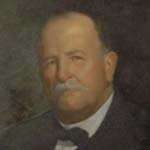 |
Pedro Opaso (1876–1957) |
— | 26 July 1931 | 27 July 1931 (Resigned) |
United Liberal Party | |
| — |  |
Juan Esteban Montero (1879–1948) |
— | 27 July 1931 | 20 August 1931 | Radical Party | |
| — |  |
Manuel Trucco (1875–1954) |
— | 20 August 1931 | 15 November 1931 | Radical Party | |
| — |  |
Juan Esteban Montero (1879–1948) |
— | 15 November 1931 | 4 December 1931 | Radical Party | |
| 22 | 1931 | 4 December 1931 | 4 June 1932 (Deposed) | ||||
| Government Junta of Socialist Republic (1932) | |||||||
| — |  |
Arturo Puga (1879–1970) |
— | 4 June 1932 | 16 June 1932 (Resigned) |
Socialist Republic | |
| — |  |
Carlos Dávila (1887–1955) |
— | 16 June 1932 | 13 September 1932 (Resigned) |
Socialist Republic | |
| — | 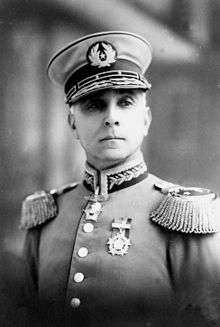 |
Bartolomé Blanche (1879–1970) |
— | 13 September 1932 | 2 October 1932 (Resigned) |
Military | |
| — |  |
Abraham Oyanedel (1874–1954) |
— | 2 October 1932 | 24 December 1932 | Independent | |
| 23 | .jpg) |
Arturo Alessandri (1868–1950) |
1932 | 24 December 1932 | 24 December 1938 | Liberal Party | |
| 24 | 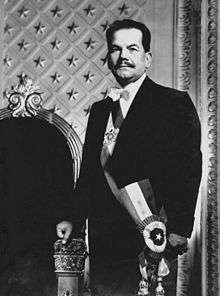 |
Pedro Aguirre Cerda (1879–1941) |
1938 | 24 December 1938 | 25 November 1941 (Died in Office) |
Radical Party (Popular Front) | |
| — |  |
Jerónimo Méndez (1887–1959) |
— | 25 November 1941 | 2 April 1942 | Radical Party | |
| 25 |  |
Juan Antonio Ríos (1888–1946) |
1942 | 2 April 1942 | 27 June 1946 (Died in Office) |
Radical Party (Democratic Alliance) | |
| — |  |
Alfredo Duhalde (1898–1985) |
— | 27 June 1946 | 3 August 1946 (Resigned) |
Radical Party (Democratic Alliance) | |
| — |  |
Vicente Merino (1889–1977) |
— | 3 August 1946 | 13 August 1946 | Independent | |
| — |  |
Alfredo Duhalde (1898–1985) |
— | 13 August 1946 | 17 October 1946 (Resigned) |
Radical Party (Democratic Alliance) | |
| — | |
Juan Antonio Iribarren (1885–1966) |
— | 17 October 1946 | 4 November 1946 | Radical Party (Democratic Alliance) | |
| 26 |  |
Gabriel González Videla (1898–1980) |
1946 | 3 November 1946 | 3 November 1952 | Radical Party | |
| 27 |  |
Carlos Ibáñez del Campo (1877–1960) |
1952 | 3 November 1952 | 3 November 1958 | Independent (FENAFUI) | |
| 28 | |
Jorge Alessandri (1896–1986) |
1958 | 3 November 1958 | 3 November 1964 | Independent (Democratic Front of Chile) | |
| 29 | .jpg) |
Eduardo Frei Montalva (1911–1982) |
1964 | 3 November 1964 | 3 November 1970 | Christian Democratic Party | |
| 30 |  |
Salvador Allende (1908–1973) |
1970 | 3 November 1970 | 11 September 1973 (Deposed) |
Socialist Party (Popular Unity) | |
| Government Junta (1973–1990) | |||||||
| — |  |
Augusto Pinochet (1915–2006) |
— | 11 September 1973 | 17 December 1974 | Military | |
| 31 | 17 December 1974 | 11 March 1981 | |||||
| 1980 (referendum) |
11 March 1981 | 11 March 1990 | |||||
| 32 |  |
Patricio Aylwin (1918–2016) |
1989 | 11 March 1990 | 11 March 1994 | Christian Democratic Party (Concertación) | |
| 33 | .jpg) |
Eduardo Frei Ruiz-Tagle (1942–) |
1993 | 11 March 1994 | 11 March 2000 | Christian Democratic Party (Concertación) | |
| 34 | .jpg) |
Ricardo Lagos (1938–) |
1999–2000 | 11 March 2000 | 11 March 2006 | Party for Democracy (Concertación) | |
| 35 | .jpg) |
Michelle Bachelet (1951–) |
2005–06 | 11 March 2006 | 11 March 2010 | Socialist Party (Concertación) | |
| 36 |  |
Sebastián Piñera (1949–) |
2009–10 | 11 March 2010 | 11 March 2014 | National Renewal (Coalición) | |
| 37 | .jpg) |
Michelle Bachelet (1951–) |
2013 | 11 March 2014 | Incumbent | Socialist Party (Nueva Mayoría) | |
See also
References
- ↑ See Sentencia Rol 78-1989 of the Constitutional Court of Chile, relapsed on the Central Bank of Chile's Constitutional Act project (declarations Nº 7 to 13).
- ↑ Bravo Lira, Bernardino (1996). "Introducción. Raíz y razón del Estado de derecho en Chile". El Estado de Derecho en la Historia de Chile. Santiago, Chile: Ediciones Universidad Católica de Chile.
- ↑ http://chile.gob.cl/en/consulados/tramites/para-chilenos/documentos/nacionalidad/
External links
- (Spanish) Presidencia
